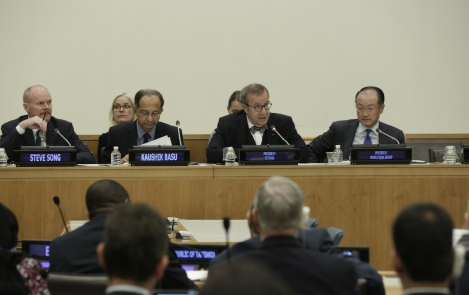-
Reset
+


President Ilves at high-level UN discussion: the implementation of better policies by countries themselves are the pre-requisites for digital development
28.09.2015
"If we wish for a digital age to become a real success story for each country and each and every individual, the implementation of better policies is required of the countries themselves," said President Toomas Hendrik Ilves, in opening the UN high-level discussion on digital matters, which was organised by Estonia, the USA, the World Bank and World Economic Forum.
The address by the Estonian Head of State focused on the development of our e-solutions and the positive influence of technology on the development of countries in general.
President Ilves emphasised that Estonia, based on its own experiences, highlights the importance of the use of assets aimed at developing countries for the development of information and communication technology in spheres where it has a considerable impact on the establishment of nationwide systems.
"We live in a digital age – half of the population of the world has access to Internet and 2/3 of people use mobile phones," stated President Ilves. "Estonia is among the few countries that has come the closest to becoming a fully digital society – technology and the use of both public and private sector e-services has become an inseparable part of our everyday life. We have also learnt that a conscious and coherent strategy pursued by the government has brought us to the present day in which citizens make intensive use of numerous e-services. Technology alone will not solve development problems; it has only been effective in combination with other reforms. In Estonia, digital development has been facilitated by linked legal and administrative reforms," told President Ilves.
He emphasised that the development of society in the digital age assumes the acquisition of skills by people that are essential for the age: "Countries must do more than simply having the interest universally accessible. The educational system plays an important role in developing the skills of people. I can say, based on the example of Estonia, that being taught digital skills from an early age promotes IT literacy and has an influence on future career-related decisions."
According to President Ilves, Estonia is always willing to enter into co-operation with other countries and share our knowledge in the IT sphere. "For example, today we already have good co-operation with the Palestinian National Authority, Tunisia and Moldova, who have implemented Estonian-like technological solutions," he added.
President Ilves confirmed that Estonia will join the "Global Connect" diplomatic initiative of the United States of America, which aims to provide 1.5 billion people with access to the internet over the next five years. "Providing access to the internet is an important step towards the growth of general welfare," emphasised the Estonian Head of State.
At the high-level UN discussion co-organised by Estonia, presentations were given by the President of the Republic of Estonia, Toomas Hendrik Ilves; the President of Tanzania, Jakaya Mrisho Kikwete; the President of the World Bank, Jim Yong Kim; and Chief Economist of the World Bank, Kaushik Basu.
Background information: The upcoming World Bank Development report 2016 on Internet and Development is being prepared under the joint leadership of President Ilves and Chief Economist of the World Bank, Kaushik Basu. The report includes both the private and public sector. The report investigates how relying on information technology could influence economic growth and the efficiency of the public sector; why this has been successful in some countries and not in others; what changes would be needed in legislation, educational systems and institutions and how to influence societies towards become accepting and open to changes. The introduction of Estonia's e-services includes an overview of our technical solutions, such as digital identity and X-road, and the attitude that is characteristic of Estonia in general – openness to technology and innovation may be the key to the development of a country and the basis for democracy and transparency. The main target group of the report are policy shapers and government officials of developing countries, international organisations and development assistance agencies, as well as representatives of public sector, academic circles and civil society associations and organisations.
Office of the President
Public Relations Department




